
Whether you are an employer who wants to support your team the best way possible, or you’re a team-lead who wants to understand how to boost productivity and success rates in your projects, or simply want to be more successful in your personal endeavours: It’s important to know what role an individual’s personality plays in the way they set, work on, and achieve goals.
Being able to cater towards different personalities’ tendencies when it comes to goal-setting, you will be able to better support others, or become more successful in they way you set and achieve goals yourself.
The connection between personality and goal setting has only recently been a part of the conversation surrounding the underlying drivers of individual behavior. More and more, people realize: No one-size-fits-all solution works for everyone when it comes to setting goals.
In a 2019 article by Gwen Moran about How to set (and achieve) goals based on your personality type, this connection has been explored in more depth. Sadly, there’s barely any meaningful research surrounding the topic.
This study’s findings promise to offer actionable insights into how different personality traits can choose more effective and tailored goal-setting strategies. The study delves into this relationship between various personality types and their tendency to set, purse, and achieve goals.
Our study was conducted on a global scale. It was part of the experience of taking our personality test to find out your most likely Enneagram personality type and included 10 questions. It was active for 10 weeks, leading to 14.913 responses from participants spanning various genders, age groups, and personality types.
The categorization of personality types in the case of this study is shaped by the Enneagram system of personality. The theory states that there are 9 distinct personality types that are driven by key motivations and fears that have shaped their behavior and worldview from when they were children. It aims to put personality on a spectrum of psychologically healthy and unhealthy levels and offers various tools to work with, accept, and shape your underlying motivations.
This diverse canvas enriches our insights into the dynamic link between who we are and how we strive. It aims to shine a light on the interplay between individual personalities and their distinctive approaches to goal formation and achievement.
By shedding light on how distinct personalities influence the goal-setting journey, this study aims to foster deeper understanding and empathy among people while contributing to the academic and practical discourse on the connection between personality and goal pursuit.
We asked people about the areas in which they typically set their goals, talking about their personal focus and area of motivation (for example career driven vs. relationship focused). Extroverted, ambitious, and competitive personalities reported a strong focus on career-related goals (49%), while pessimistic, self-critical or more cautious personality types show less interest in career goals (35%).
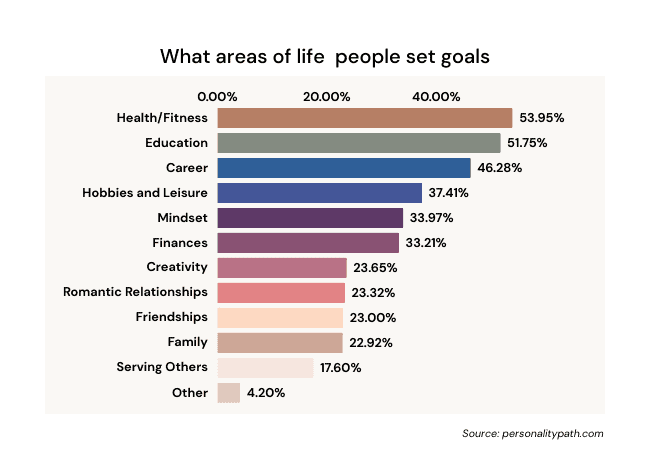
More methodical, headstrong, and pondering personality types tend to prioritize education (62%), while spontaneous and impulsive personalities (48%) are less inclined. Financial goals resonate with thinkers and skeptic or risk-averse personalities (28%) as well as with highly motivated or ambitious personality types (35%).
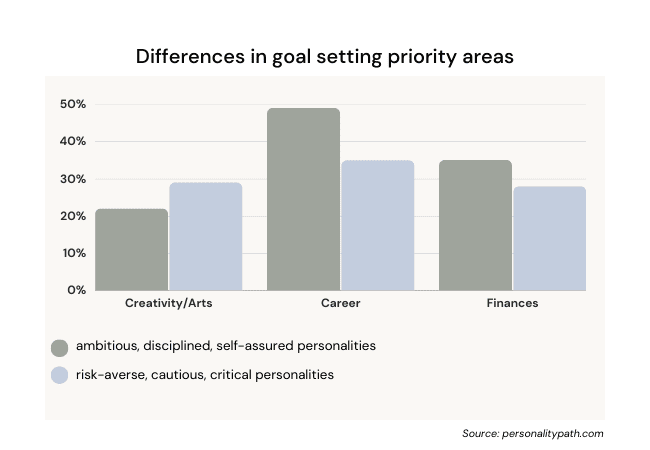
In the realm of friendships and relationships, personality types that are highly outgoing and spontaneous or simply more driven by their emotions, as well as – interestingly so – reliant and cautious personalities stand out as more goal-oriented than any other personality types.
Individuals who are highly motivated, outgoing and risk-prone, set new goals more frequently (more than 4 times a year), whereas more methodical, risk-averse and indecisive personalities tend to set fewer goals for themselves from the get-go. 23.8% of cautious and less confident personality types indicated they never set goals at all, whereas only 5% of risk-prone and confident personality types answered “Never”, showing it’s 5 times more likely for protective, cautious, and risk-averse personality types to avoid setting any goals compared to optimistic, self-assured, and trusting personality types. The majority of people asked in the study are content to set goals once or 2-3 times a year (28%).
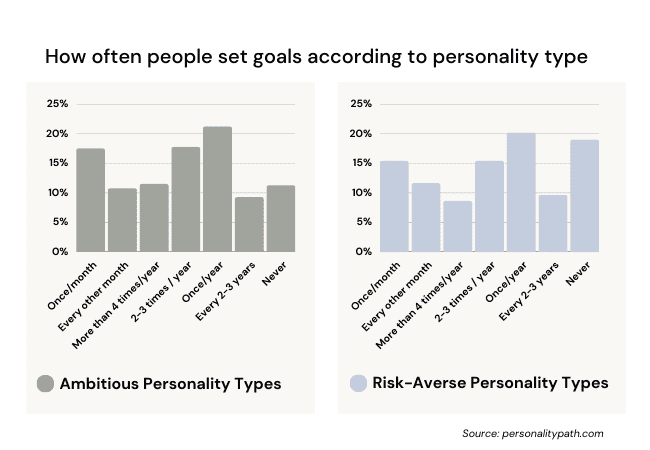
Every person has some sort of innermost reaction to the different aspects of setting goals and potentially achieving them. Non-competitive, disciplined, and cautious personality types show higher stress levels associated with initial goal setting (29%), almost twice as high as confident and risk-prone types (16%), while personality types that are more on the impulsive side of decision-making, as well as headstrong and methodical personalities, are more confident (32%) and thus less emotional when it comes to setting goals. Similarly, cautious and withdrawn personalities also tend to feel twice as anxious and overwhelmed about the potential outcome of setting new goals (38%) compared to ambitious personality types. Impulsive and spontaneous personality types, as well as achievement-oriented personalities, note that anxiety doesn’t play a role for them.
The personalities that are most excited about setting new goals, with 45% of people asked, were types that are trusting of their instincts and not averse to taking risks. It’s interesting to note that personality types that tend to be more disciplined and reliant express a sense of hopefulness regarding their goals, whereas the cautious and risk-averse types score as least hopeful. Confidence in their own goal-setting ability is highest among optimistic, methodical, and self-assured personality types (32%), almost twice as high as the confidence levels of less ambitious or self-critical personalities (18%).
Preparation strategies for goal setting vary across personality types. Withdrawing and risk-averse types, as well as spontaneous and instinctually driven personalities, are more inclined towards minimal preparation, whereas highly methodical types stand out for research-based preparation (21%).
Contrarily, prioritization as a preparation technique is embraced by highly decisive and ambitious personalities (24%). Notably, highly disciplined and self-critical types are more likely to write down their goals, as do impulsive and spontaneous personality types. Neither pessimistic personalities nor instinctual personality types showed much favor for using this technique. Defining a clear “why” is particularly important for highly ambitious and self-assured types (27%) however.
Resource utilization can vary from creating To-do lists, forming new habits, and visualizing one’s goal. These are commonly used by various personality types, whereas systems and accountability mechanisms can be found as weapons of choice for their personality counterparts.
More ambitious and competitive personalities gravitate towards systems or even a combination of systems and accountability, whereas headstrong, independent and spontaneous types lean toward accountability. Celebrating wins is a prominent strategy for these types, as well as self-critical personality types, to stay on track (28%).
The study also provides insights into how different personalities deal with setbacks. 51% of highly ambitious and decisive personalities, as well as the methodical personality types, tend to stick to their strategies, even when faced with obstacles. In contrast, 30% of participants with more indecisive, skeptic, and self-critical personality traits noted that they are quick to let go of their original plans or even their entire goal. Non-competitive and risk-averse personality types (22%) are particularly inclined to change their approaches.
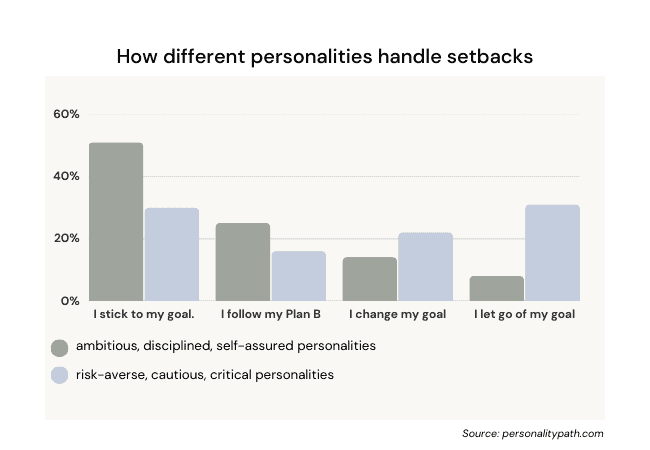
Barriers to goal achievement vary across personality types. Spontaneous and impulsive personalities often struggle with discipline, while disciplined and protective personalities occasionally set overly ambitious goals. Overanalyzing is more common among skeptic or highly cautious personalities. Pessimistic and self-critical personality types struggle with motivation and procrastination the most.
The study reveals that the majority of participants achieve between 51-75% of their goals, with self-critical types typically achieving less than 50% of their goals, and highly ambitious and optimistic personality types, as well as methodical and reliant personalities achieve more than half of what they set out to achieve. It’s worth noting that 7% of ambitious and confident personality types indicated that reaching 100% of their goals was natural, which is 7 times as high as cautious, risk-averse and overthinking personality types. Vice versa, 5% of these less ambitious, and risk-averse types admit to reaching 0% of their goals, compared to only 1% of self-assured and ambitious types.
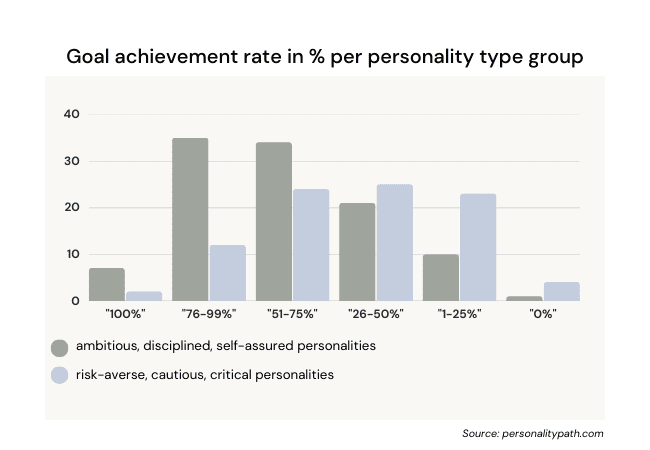
The findings show that there’s an intricate relationship between personality types and goal-setting. Learning about how different personality types not only approach preparing for goal setting, but handle hurdles along the way, it is safe to say that there’s not one goal-setting strategy to work for everyone – there is no universal formula for success.
Recognizing your unique personality traits can empower you to tailor your goal-setting strategies to align with your strengths, motivations, and challenges. By embracing this personalized approach, you can embark on a journey of goal achievement that is both fulfilling and effective.
We would love to hear your personal experience with goal-setting: Share your story or thoughts in the comments – or reach out to us directly at [email protected]
As professionals or researchers, your participation in and engagement with this study contributes to a discourse that promises to redefine the nexus of personality and goal setting, enriching both research and practical applications. We would love to hear your expert opinion.
If you’re interested in the study framework and detailed results: You can find a more detailed overview over the study specifics here.
We want to thank Juanita McDowell, motivational speaker and president of InMotion Group for her contribution, feedback, and input. We also want to thank Kenneth M. Nowack, president and chief research officer at Envisia Learning for his contribution.
If you want to dive deeper into personality types, personality development, and goal setting, these resources may be helpful to you:
Don Richard Riso & Russ Hudson: The Wisdom of the Enneagram
David Keirsey: Personality Type – A User’s Guide
Ian Morgan Cron: The Story of You
Suzanne Stabile: The Path Between Us
Angela Duckworth: Grit – The Power of Passion and Perseverance
Kenneth M. Nowack: Urban Talent Myths Exposed
(You can find a selection of more book recommendations here.)